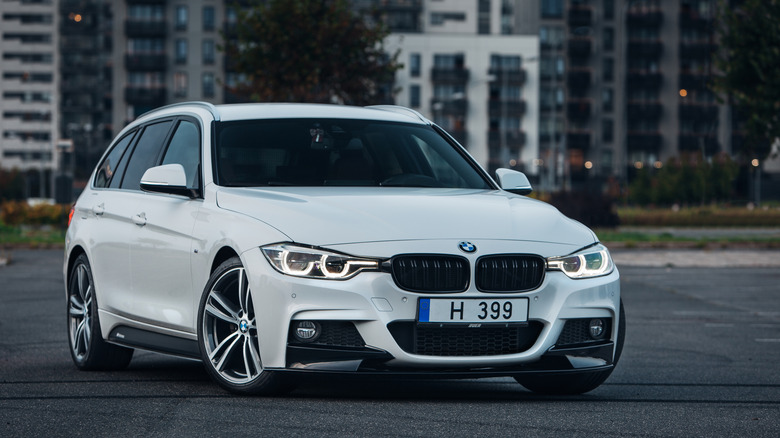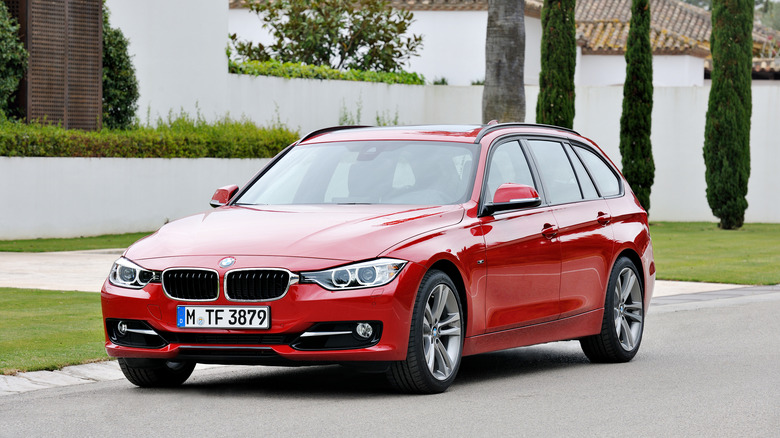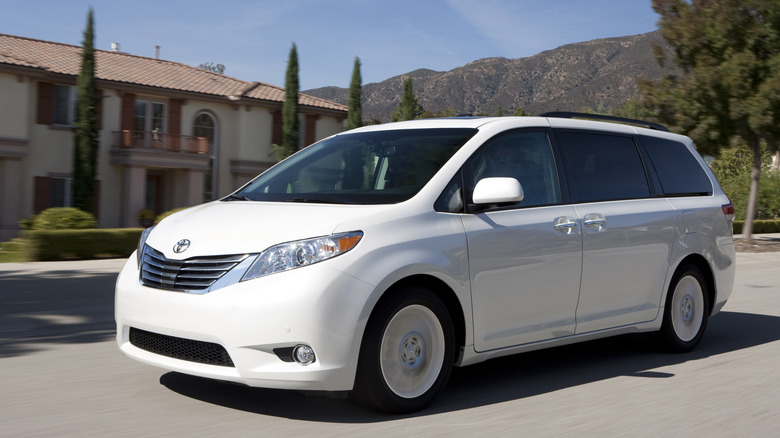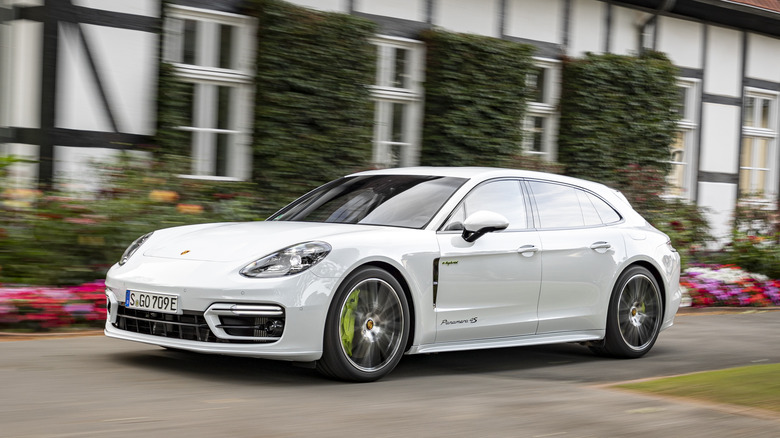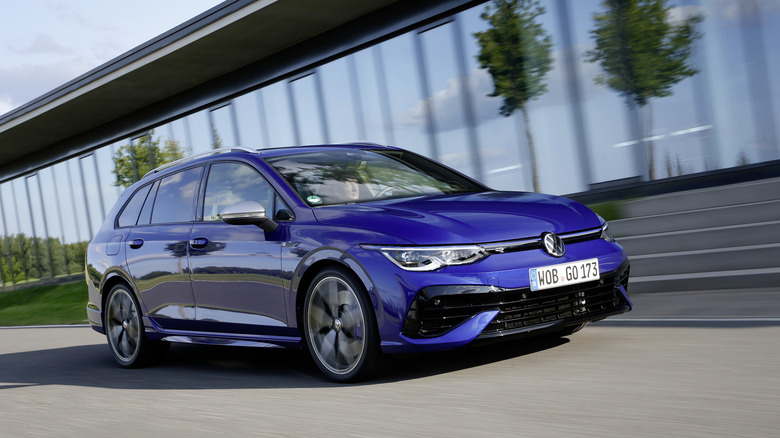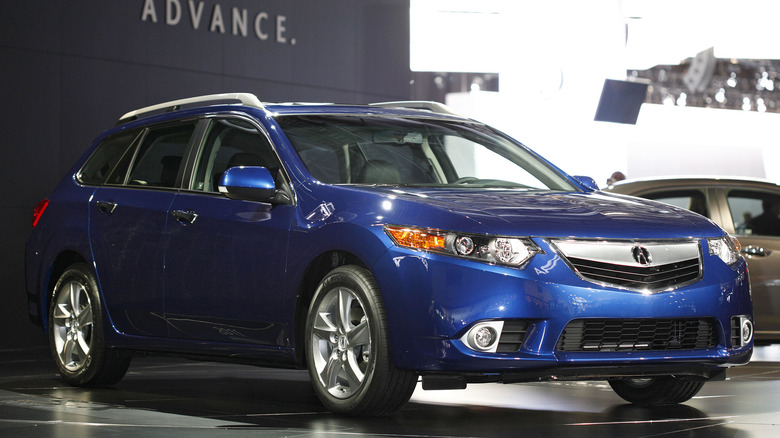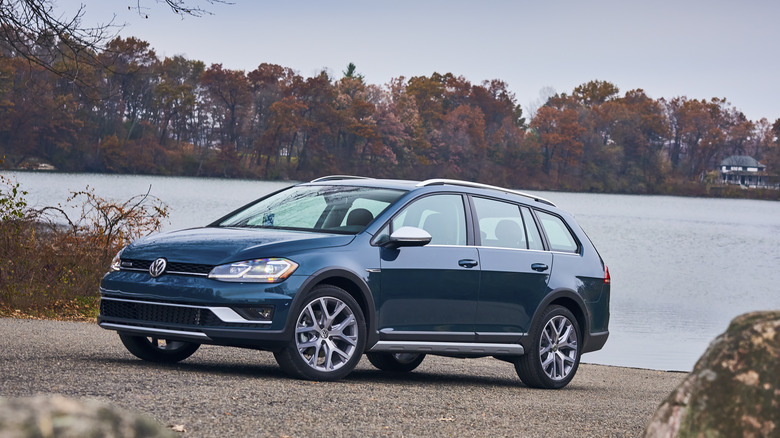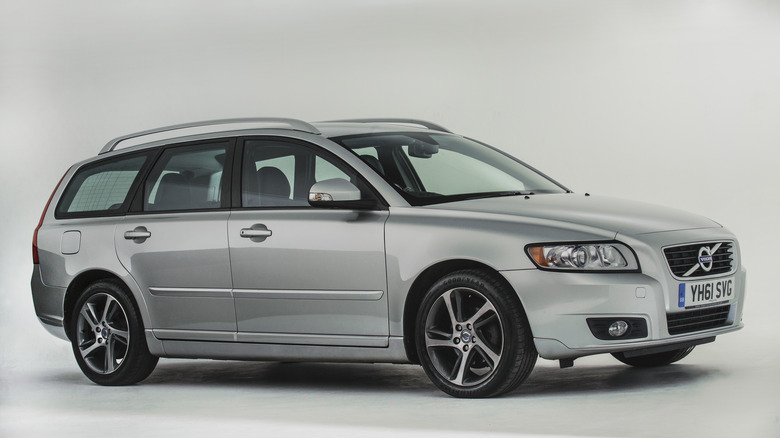8 Super Practical Used Cars You Should Consider Over An SUV
We're constantly told and we keep seeing that SUVs dominate the world. No matter how small the vehicle is, tack on some plastic body cladding and larger wheels, maybe some AWD, and instantly, it becomes a best-seller. As somebody who's had a good amount of seat time in them, I can say with confidence that there's nothing inherently wrong with the latest scope of family SUVs. In fact, the best SUVs from major brands are actually quite good.
However, as somebody who has also had a fair amount of experience behind the wheel of various practical, fun cars that aren't SUVs, I can also say that buyers and enthusiasts can do a lot better.
Once upon a time, the idea of a family car that's not necessarily 15 feet up from the ground was fairly successful. And then it wasn't. Automakers stopped believing in the idea of wagons, and while minivans are still doing pretty well, they still live in the shadow of the sport utility vehicle.
Next time you're shopping for a family vehicle, forget the SUVs for just a second and check out some of these awesome oddities on the used market. More often than not, you'll get AWD and plenty of practicality, but also a much better drive and a more attractive exterior.
BMW 3 Series Touring (F31)
Back when BMWs actually looked good. Sadly, due to the decline of the wagon segment in North America, the 3 Series Touring would not see another generation after the F31. The F31 3 Series Touring is a pretty rare breed, but there's plenty of reasons to have one — especially the 335i.
Unfortunately, the F31 3 Series Touring never came as the diet M3, aka the 335i in North America. Every F31 3 Series Touring came with a 2.0-liter turbo four-cylinder, and some also offered a robust diesel with an excellent 280 lb-ft of torque. Every version also offered a six-speed manual transmission and xDrive. Speaking of xDrive, an F31 wagon makes a lot of sense with AWD, so those are the ones to look for.
With 13 cubic feet of cargo space, there is plenty of room to carry the entire family's luggage, and there's a surprising amount of room inside for passengers. Being that the F31 is not especially old, you get a good number of modern mod cons, and there are plenty of options to retrofit stuff like Apple CarPlay and Android Auto. If you're feeling brave, you can pick up an F31 for less than $10,000. $20,000-$25,000 should be a pretty safe bet, as long as there's a full service history. If you feel like splashing cash and putting in some time and effort, you can always swap in an N55 from the excellent 335i. I've driven a fine example of the 335i and I can tell you that it's worth the work and investment.
Mercedes E-Class Wagon (W211)
Before Mercedes was hell-bent on taking the crown from Tesla and cannibalizing the sales of its AMG models, cars with the three-pointed star had a lot of soul, and a lot of class. That was certainly the case with the W211 E-Class, sold in North America from 2003 to 2009. The W211 featured understated, elegant styling, all the features you could want, and both sedan and wagon bodystyles.
The W211 wagon is a fantastic piece of design, with the design language of the time transitioning perfectly into a long-roof body. Even though the W211 came along well into the era of Mercedes cutting costs (and reliability), the W211 is pretty robust if maintained properly. A plethora of powertrains were offered, including a diesel V6 in the E320 CDI and a gas V6 in the E350, both of which offering 4MATIC AWD. Of course, there was also an E55 and E63 AMG if that's more your thing.
I've driven the E320 CDI and the E350, and they're both fantastic. The E320 is surprisingly brisk for having around 200 hp, but there's plenty of low end torque. Meanwhile, the E350 pulls stronger than you might think, generating a fabulous noise in the process.
The W211 E-Class wagon also offered a feature we pretty much never see anymore: rear-facing third-row seats in the cargo area. Without those, the cargo area comes in at an impressive 24.4 cubic feet. These days, you can pick up a W211 for less than $10,000, and that includes lower-mile examples.
Toyota Sienna (XL30)
The SUV is eating into the sales of the humble minivan, which is rather unfortunate. In an attempt to stay relevant, a lot of modern minivans are getting super complicated, with hybrid powertrains and an abundance of technology. But sometimes you just need a simple, safe, durable family bus that won't break the bank. That's exactly where the XL30 Toyota Sienna came into play.
Beginning its production in 2010 for model year 2011, the Sienna was a great evolution of Toyota's flagship minivan. This was the last generation to not offer a hybrid powertrain, opting instead for a large capacity four-cylinder, or a 3.5-liter V6. This engine is also known as the 2GR-FE, from Toyota's well-known GR family of engines. Yes, that means you can tell people that your minivan has the same powertrain as the Lotus Evora. That also means you can squeeze a good amount of extra power out of it. Just in case you want some of the weekend car's characteristics in the minivan.
Obviously, there's much more to the Sienna than the engine, though. AWD is very common, as it is on modern SUVs, and there's also the small fact that the Sienna can seat eight people. While it may have some tiny reliability asterisks to look out for, the XL30 Sienna will definitely last long enough to see your kids take off to college. Lower mileage examples aren't that easy to find, but with proper maintenance, that shouldn't be an issue. A good XL30 Sienna will set you back anywhere from $15,000 to $20,000, which is great value.
Porsche Panamera Sport Turismo
Now for the complete opposite side of the spectrum. This one requires a significantly higher budget, but for that, you get one of the ultimate family cars. For the second generation Panamera, Porsche introduced the Sport Turismo station wagon, something that the Panamera should have always offered. Sadly, because no one is buying wagons, the Sport Turismo is no longer available. Cue the sad violin.
The Sport Turismo sorted out the Panamera's proportion issues, and it also made it infinitely more practical. With 18.3 cubic feet of cargo space on offer, the Panamera Sport Turismo definitely earns its title as a station wagon. It also swaps out the captain's chairs in the back for a bench seat, meaning it can seat five passengers. Along with these great practicality benefits, it's also, you know, a Porsche Panamera.
Powertrains ran the gamut from a 2.9-liter V6 with 325 hp all the way to a 690 hp plug-in hybrid V8 in the Turbo S E-Hybrid, and there's also the delicious sounding twin-turbo V8 GTS, which I have driven. It's wonderful, as you might expect. The Panamera features all the tech and features you could want, and all the performance you probably don't need but have as well. Just be careful not to scare your loved ones, because the Panamera pulls hard no matter what powertrain is under the hood.
Volkswagen Golf R Estate
The Volkswagen Golf R is a fantastic hot hatchback, and almost certainly the last of its kind. The Mk8 Golf R improves on the established formula more than ever, and it's one of the best hot hatchback offerings currently on the market. It's also one of the last ones to be available in the United States and Canada, which means drivers on this side of the Atlantic are missing out on the best version of the Golf R.
Markets like Europe also get the rather attractive option of a Golf R Estate. As the name implies, it's everything we love about the Golf R wrapped up in a much more practical wagon body. That means it still uses a 2.0-liter turbo four cylinder with a mighty 315 hp, and a 0-60 time of less than five seconds. There's even a drift mode. In a wagon. With 21.5 cubic feet of cargo space.
Naturally, AWD is standard and so is a dual-clutch automatic transmission. If you can put up with the Mk8 Golf's very annoying ergonomics and technology — and believe me, they really are annoying — this is a much better way to transport the family quickly and comfortably. You lose the slight ground clearance advantage of an SUV, but from just about every other aspect, the Golf R Estate offers up more excitement and real-world usability than any Tiguan could ever muster.
Acura TSX
In the early 2000s, Honda decided to give North America a taste of what Europe and Japan called the Accord. It brought over the CL7 Accord to North America and badged it as the Acura TSX, thus filling a compact sports sedan gap in the Acura lineup. Despite being one of the company's less successful cars, the TSX was one of the best-driving sports sedans of its day, and certainly one of the best driving Acuras. Having driven both, I can say the same for the second generation, too.
The second generation TSX was based on the CU2 generation Accord, which came right after the CL7. It's great to drive, well-equipped, super reliable, and definitely a looker. Acura also ended up offering a wagon version of the second generation TSX, offering up a good amount of extra cargo space and interior room. It was powered by the excellent K24 2.4-liter four banger putting out 201 hp.
Sadly, the brilliant J35 V6 engine, exclusive to the TSX and never offered on the CU2 Accord outside North America, was never available on the wagon, nor was AWD. However, the TSX can certainly handle most of the off-roading that most SUVs end up doing throughout their lives. Plus, the drive is much better, there was a manual transmission available, and it's a great choice for the enthusiast who likes an underdog. Eyebrow raises (the good kind) will definitely happen at Cars and Coffee.
Volkswagen Golf Alltrack
As mentioned previously, the Golf R Estate was never offered in North America. However, Americans got to enjoy a different type of Golf wagon, which wasn't as exciting but was definitely every bit as cool. The Golf Alltrack came along in 2017 for the United States and Canada, and it was based on the existing Golf Sportwagen. The Alltrack added plastic body cladding, raised suspension, and standard AWD. With all that, it essentially became a Golf version of the Subaru Outback.
Sadly, the Alltrack released in the midst of Volkswagen's infamous Dieselgate scandal, so it missed out on one of the best powertrains offered in the Mk7 Golf: the 148 hp 2.0-liter TDI turbodiesel. When paired up with the DSG automatic transmission, the diesel was a great performer, and the gearbox was refreshingly quick and smooth no matter how much throttle you give it. The 1.8 TSI gas unit was still plenty solid, though, with a more than serviceable 170 hp. That power went to all four wheels through either a six-speed manual or a six-speed DSG automatic.
The TDI was offered on the regular Mk7 Golf Sportwagen, and swapping it out should be fairly easy. In fact, most VW engines from the time period should just plug and play. Even without the complication of engine swapping, the Golf Alltrack is a great antidote to the standard SUV, and one of the most underrated and surprisingly affordable family cars on the market.
Volvo V50
Volvo's thing has pretty much always been massive, boxy wagons with all the space in the world and numerous other talents. In the early 2000s, after being acquired by Ford, Volvo decided to keep the compact wagon in its lineup alive. This started with the V40 in the 90s, and after that came the V50.
The V50 was based on the P1 platform, which also underpinned the likes of the second generation EU-spec Ford Focus and Mazda 3. This meant that the V40 was, generally, cheaper and simpler to maintain, but it was still a Volvo through and through. It's still pretty practical, spacious, safe, and it's great to drive.
Of course, being a Volvo, there was also a 2.5-liter turbocharged five-cylinder engine on offer. That one could be paired up with AWD, and it made 218 hp available at the driver's disposal. This resulted in a wagon that, as I discovered not too long ago, is surprisingly good behind the wheel. It's composed, comfortable, good in the corners, and the manual is great to handle. The V50 is one of the cheapest used station wagons on the market, and thanks to that Volvo I5 under the hood, even higher mileages won't be that big of a deal as long as the maintenance has been kept in check.
